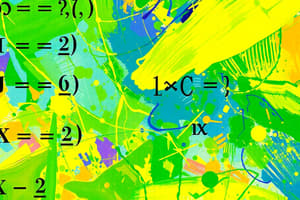Podcast
Questions and Answers
What is the primary focus of algebra?
What is the primary focus of algebra?
- Analyzing statistical data and probability distributions
- Solving geometric problems involving shapes and angles
- Performing complex calculations with exact numbers
- Exploring the relationships between quantities using variables (correct)
Which of the following is NOT a central concept in algebra?
Which of the following is NOT a central concept in algebra?
- Calculating derivatives (correct)
- Combining like terms
- Solving quadratic equations
- Working with functions
What is the key aspect of functions that establishes connections between sets of inputs and outputs?
What is the key aspect of functions that establishes connections between sets of inputs and outputs?
- Range
- Intersection
- Mapping (correct)
- Domain
In an algebraic expression, what does the operation of division involve?
In an algebraic expression, what does the operation of division involve?
What is the purpose of substitution in solving systems of equations?
What is the purpose of substitution in solving systems of equations?
What is the purpose of solving a system of equations?
What is the purpose of solving a system of equations?
How does algebra provide a powerful framework for understanding and tackling diverse challenges?
How does algebra provide a powerful framework for understanding and tackling diverse challenges?
Which operation allows for the creation of more complex algebraic expressions?
Which operation allows for the creation of more complex algebraic expressions?
In algebra, what does the 'range' refer to?
In algebra, what does the 'range' refer to?
What distinguishes algebra from other branches of mathematics?
What distinguishes algebra from other branches of mathematics?
Which method for solving systems of equations involves plotting each equation on a coordinate grid?
Which method for solving systems of equations involves plotting each equation on a coordinate grid?
Which application domain utilizes algebra to forecast outcomes based on historical data trends?
Which application domain utilizes algebra to forecast outcomes based on historical data trends?
Flashcards are hidden until you start studying
Study Notes
Introduction
Algebra is a branch of mathematics that deals primarily with quantities and their relationships. It is distinguished by the use of letters or symbols to represent values, making it useful for addressing scenarios where exact numbers may be unavailable or unnecessary. This approach enables the resolution of problems that rely on logical reasoning rather than computational precision.
Algebra Basics
At its core, algebra involves manipulating expressions, solving systems of equations, and working with functions. Central concepts within algebra include:
- Combining like terms: simplifying expressions by adding or subtracting identical terms together.
- Linear equations: equations involving only first or highest degree terms.
- Solving systems of equations: determining values that satisfy multiple equations simultaneously.
Algebraic Expressions and Manipulation
Algebraic expressions consist of various operations, such as:
- Addition: combining terms with common factors.
- Subtraction: removing terms from an expression.
- Multiplication: multiplying terms based on their coefficients.
- Division: dividing terms by a coefficient.
These operations allow for the creation of more complex expressions, enabling a vast array of problem-solving possibilities.
Systems of Equations
A system of equations represents a set of multiple equations with the same variables. Solutions to these systems involve finding values for the variables that satisfy every equation within the system. Methods for solving systems of equations include:
- Elimination: introducing zero pairs of variables and eliminating one variable through subtraction.
- Substitution: solving one equation for one variable and substituting the result into another equation.
- Graphical representation: plotting each equation on a coordinate grid and identifying intersection points.
Functions and Relationships
Functions establish connections between sets of inputs and outputs. Key aspects of functions include:
- Domain: the set of feasible input values.
- Range: the set of possible output values.
- Mapping: assigning each input value a single output value.
Studying functions allows for the exploration of various relationships and dependencies between inputs and outputs, providing valuable insights into problem structures.
Applications of Algebra
Algebra's versatile nature opens doors to a multitude of applications across disciplines. Examples of algebraic concepts being applied in practical contexts include:
- Modeling financial transactions: using equations to analyze profitability and risk management.
- Design optimization: employing algebraic principles to enhance structural integrity and reduce costs.
- Predictive analytics: utilizing algebra to forecast outcomes based on historical data trends.
In conclusion, algebra offers a powerful framework for understanding and tackling diverse challenges. Its ability to capture abstract relationships and provide clear, concise expressions facilitates the translation of complex scenarios into manageable and analytically tractable domains.
Studying That Suits You
Use AI to generate personalized quizzes and flashcards to suit your learning preferences.




